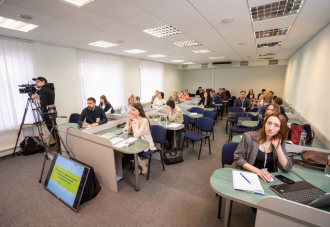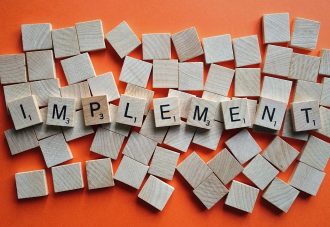The final event of the Mentorship Program to strengthen the advocacy capacity of civil society organizations took place on September 17 and 18 in Kyiv.
This event was the result of six-month Mentorship Program, which lasted from April to September 2020. In it, 15 sustainable civil society organizations (CSOs) became mentors for 15 selected young CSOs (mentees) and helped them develop and strengthen their advocacy skills. At this meeting, mentors and mentees shared the results and experiences of working together.
The program was implemented within the project “Ukrainian Civil Society Sectoral Support Activity” implemented by a consortium of Initiative Center to Support Social Action “Ednannia”, the Ukrainian Center for Independent Political Research (UCIPR) and the Centre for Democracy and Rule of Law (CEDEM). Alona Matviichuk, coordinator of the Mentorship Program, was the event moderator.
According to Volodymyr Sheihus, Executive Director of Initiative Center to Support Social Action “Ednannia”, the Mentorship program strengthens both young organizations and civil society in general.
“In Ukraine, NGOs do not have many opportunities to receive not only money for their own activities, but also support. Therefore, it is important that CSOs could learn new information, learn from best practices and meet colleagues in the sector, because it opens up new opportunities,” he said.
Therefore, the Mentorship Program helps NGOs become self-sufficient: when CSOs work with partners, define and shape the collective “agenda” in society and change the communities or areas in which they work for the better.
The program itself was the result of cooperation between the team of organizers, mentors and mentees, so Olesia Kholopik, CEDEM Director, thanked all participants.
“I will start by thanking the Consortium team for their joint work, faith and support. Thank you to the mentees for learning and sharing goals, thank you to the mentors for becoming real mentors: sharing their experience, telling how to implement projects,” said the CEDEM Director.
Olesia Kholopik stressed that the history of the program does not end this day. A community of alumni is being created, which the organizers will continue to support. “There is an understanding that we should join the next mentoring program,” she concluded.
The Mentorship program was positively assessed by both mentors and mentees. Thus, 92% of mentors noted its impact on the ability to be mentors, 57% are ready to provide such services again to other organizations. 9.25 out of 10 points – this is the score given by the program mentors.
The mentees also gave a positive response: young CSOs rate their ability to implement and develop advocacy plans in the future at 7.6 out of 10, and their ability to influence at 7.2 out of 10.
During the program, each of the 15 mentee organizations developed and began implementing an advocacy plan in collaboration with the mentor. In particular, the projects covered the topics of barrier-free education, environmental protection, gender policy, the rights of migrant workers and developing citizens’ political culture before the elections.
The mentors and mentees worked together throughout the program. Mentors spent approximately 144 hours on this work. Also during this period, there were a number of training events for the mentee (a total of 22 hours) and two workshops, where experts shared theoretical and practical knowledge about advocacy and the implementation of advocacy campaigns.
According to Liliia Olefir, mentor and executive director of the NGO Life, the work in the program was a mutual exchange of knowledge, because it was interesting to understand the local specifics faced by organizations outside the capital city.
We did not have “mandatory communication”. We identified comfort zones where mistakes could be made, where issues could be discussed while respecting the space of each other. I think it is very important to be able to survive mistakes, find solutions, come across ideas, rather than just say “do so and so,” shared her mentoring experience Liliia Olefir.
Bohdan Lepiavko, head of the Kyiv Cyclists’ Association NGO, also stressed that at some stage public activities may seem difficult due to the need to study the topic thoroughly and interact with the authorities, but over time activists “grow up” and become experts in their field. Therefore, they talked about the issue of vision with the mentees. “It would be very valuable for me if someone had helped me in this way five years ago,” he concluded.
This event is made possible by the generous support of the American people through the United States Agency for International Development (USAID) within the Ukraine Civil Society Sectoral Support Activity implemented by Initiative Center to Support Social Action “Ednannia” in partnership with the Ukrainian Center for Independent Political Research (UCIPR) and the Centre for Democracy and Rule of Law (CEDEM).



